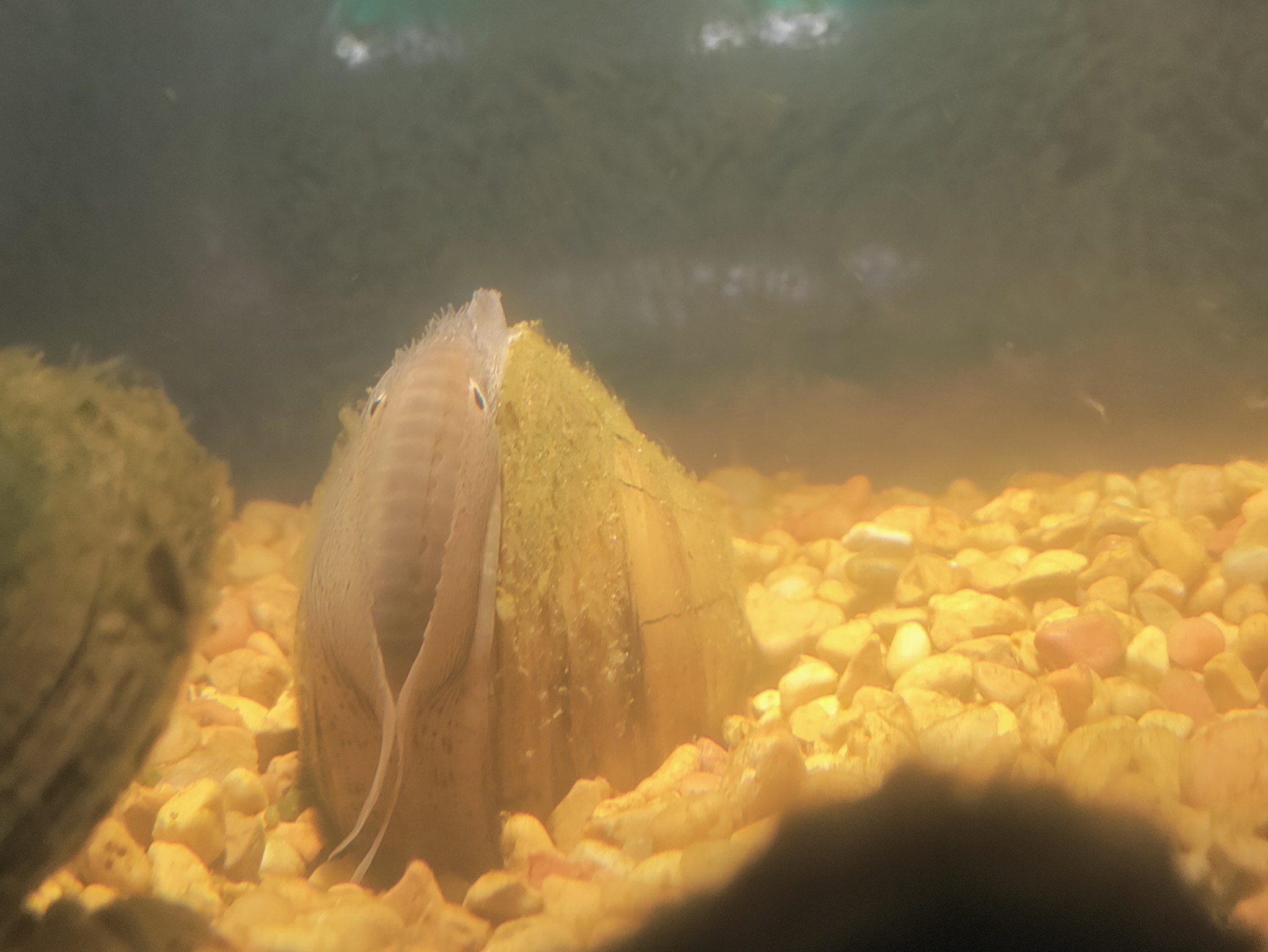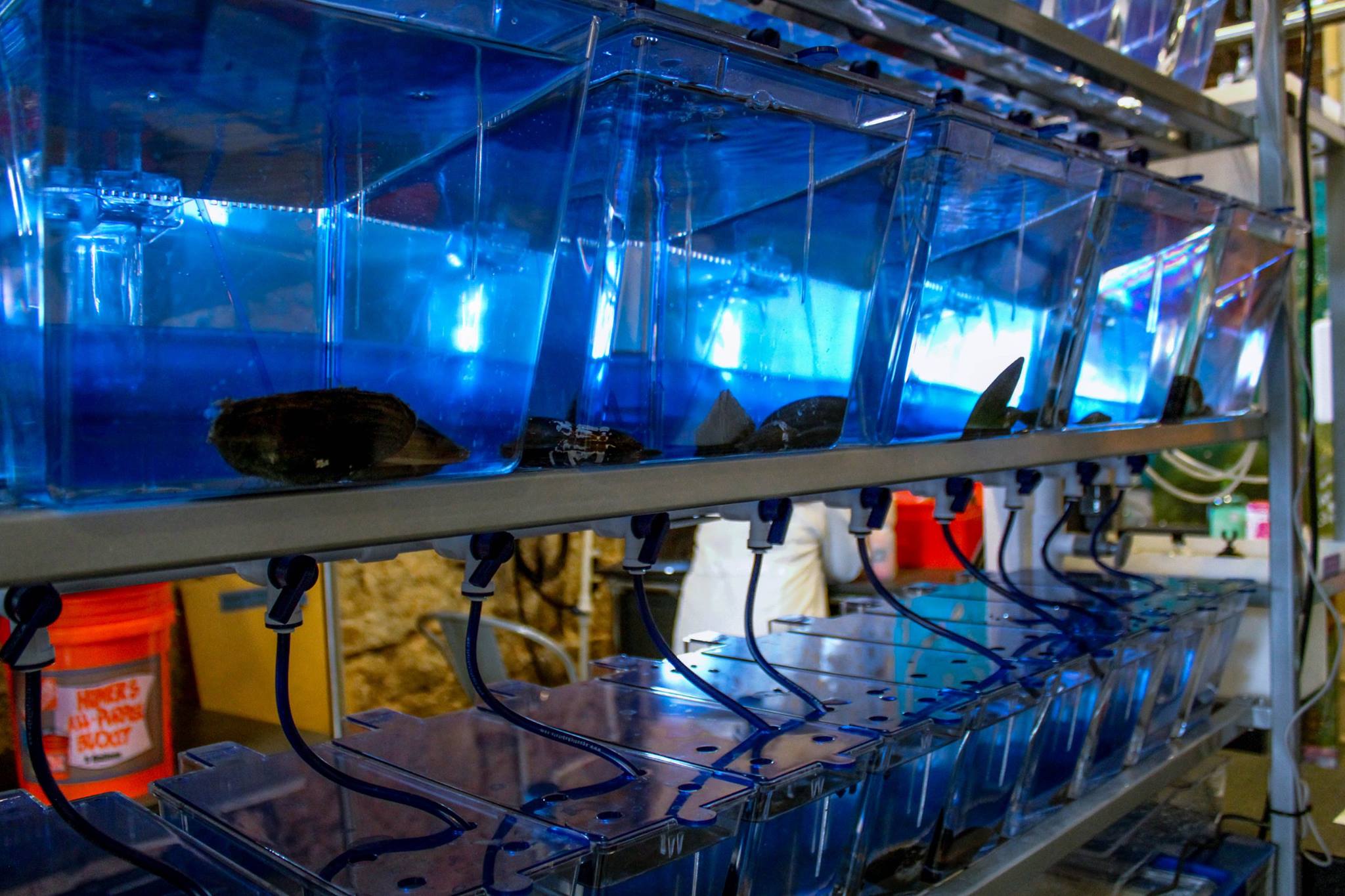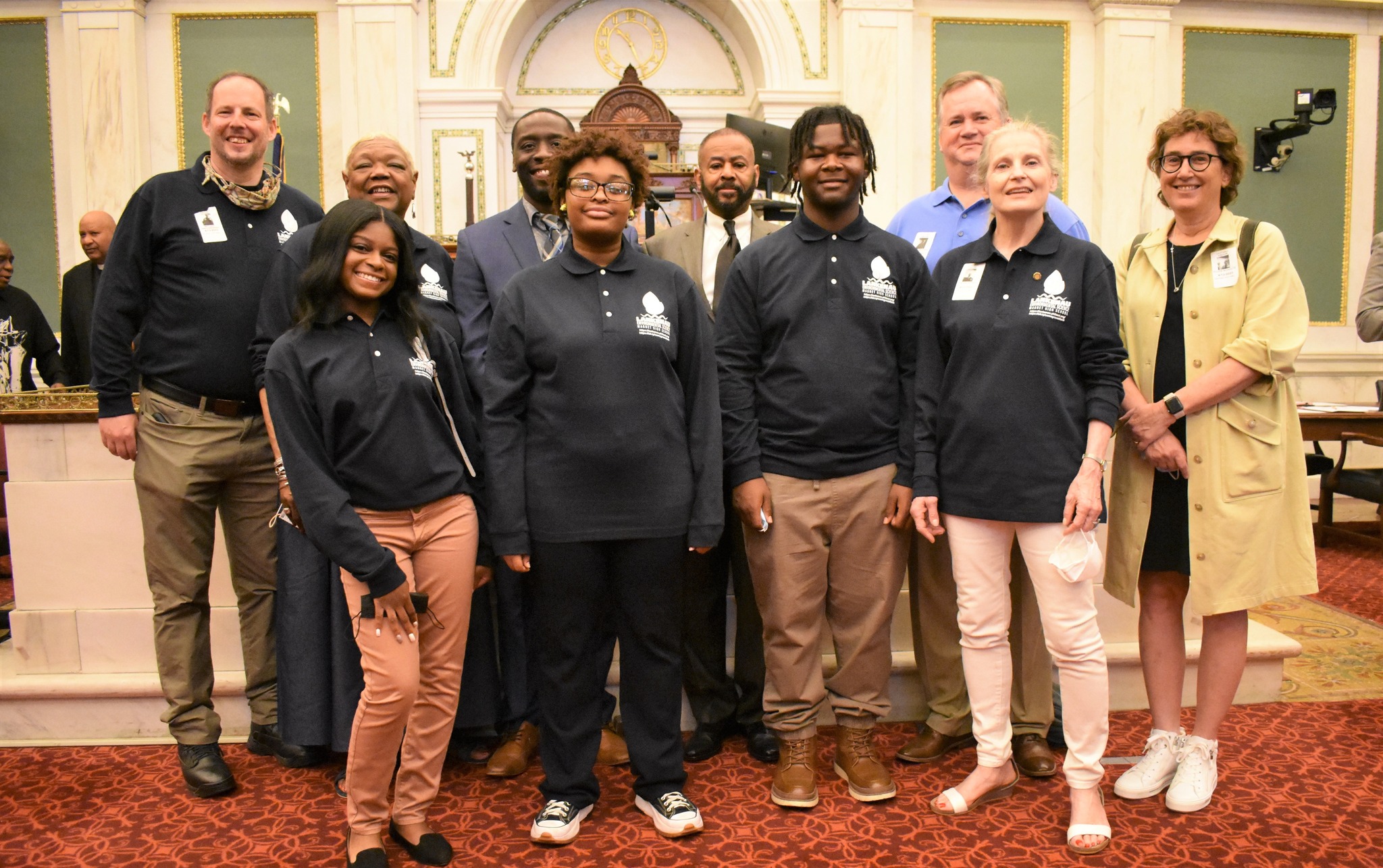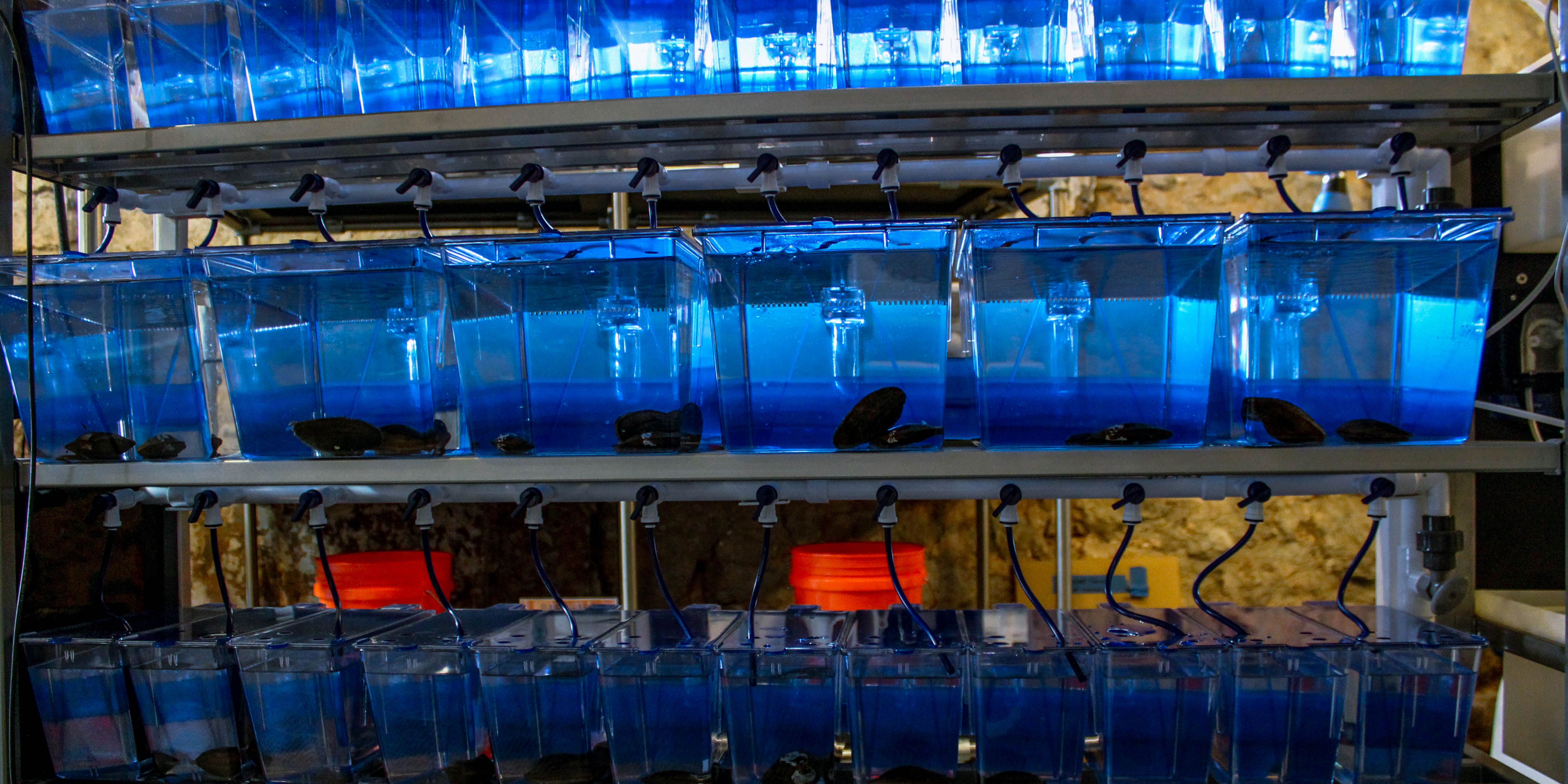We’re commissioning some unlikely creatures to help keep our waterways clean – mussels.
After being closed for more than two years following flood damage from Hurricane Ida, the Freshwater Mussel Hatchery at the Fairmount Water Works Interpretive Center is having a busy spring and summer. This season will mark the third full year PWD is collaborating with the Aquatic Resource Restoration Center (ARRC) to operate the educational hatchery in the historic building and learning space.
Totaling more than 700 species across the world, freshwater mussels can improve water quality and serve as indicators of aquatic health.
In the past, more than a dozen species lived in local waterways. However, only a few are found today around New Jersey, Pennsylvania, and Delaware – and populations continue to decline throughout nearby watersheds.
So, we’re working to mend this reduction at the hatchery where we essentially raise these tiny aquatic animals before releasing them into waterways in and around Philadelphia
Since 2020, more than 25,000 mussels have been propagated at the hatchery, including five native freshwater mussel species. On a daily basis, just one adult mussel can filter between 10 to 15 gallons of water per day.
New Approaches to Propagation
One crucial research area includes propagation techniques to increase mussel reproduction. Diet, water types, fish care, and culture systems have all contributed to the successful breeding of these bivalve mollusks (meaning they have two hard shells to protect their soft bodies).
 A Yellow Lampmussel female who is actively displaying her lure. The lure is used to attract an unknowing host fish so she can broadcast her larvae (glochidia) onto the fish and ultimately attach to its gills.
A Yellow Lampmussel female who is actively displaying her lure. The lure is used to attract an unknowing host fish so she can broadcast her larvae (glochidia) onto the fish and ultimately attach to its gills.
Many mussel species in the wild use a specific fish as a host during their reproduction cycle, which can be hard to replicate in a hatchery setting. Our successful propagation of two native mussels has been possible thanks to in vitro techniques, a procedure that skips this fish-host process.
Across the lower Delaware River Basin, juvenile mussel culturing has been implemented in natural and man-made aquatic habitats. These mussel “grow-out” areas include Green Lane Reservoir in Montgomery County, Strawberry Mansion Reservoir in Fairmount Park, Van Sciver Lake in Bucks County, and Longwood Gardens, in Chester County.
Some Impressive Statistics
- 8,400 Eastern Elliptio (Elliptio complanata) have been produced in the FWWIC hatchery in 2023
- Approximately 3,000 to 4,000 Eastern Pondmussels (Sagittunio nasutus) are planned to mature by early July
- An additional 6,000 to 8,000 Yellow Lampmussel (Lampsilis cariosa) coming in July and August
- In short, we could hit approximately 15,000 mussels from 3 species this year!
“There exist many bottlenecks in successfully cultivating freshwater mussels,” says Lance Butler, a senior scientist with PWD’s Office of Watersheds. “The unique parasitic relationship between mussel larvae and host fish is perhaps the most obvious. Trying to find the most appropriate host and the optimum host fish size have been a cornerstone of our research at the Fairmount Waterworks Interpretive Center and I’m pleased to announce that we’ve cracked this enigma with three of the functional dominant species in the tidal Delaware River. In addition to host-fish relationships, we’re also investigating different culturing technologies to improve upon efficiencies and propagation success.”
 Mussel Hatchery at the Fairmount Water Works. (Photo source: Fairmount Water Works Interpretive Center)
Mussel Hatchery at the Fairmount Water Works. (Photo source: Fairmount Water Works Interpretive Center)
Helping Hands
This hatchery reprise is engaging local youth.
More than 600 students from six Philadelphia regional schools have actively participated in the “Mussels In The Field” program. The curriculum includes education about freshwater mussels and related field monitoring techniques and data.
“These students are the eyes and ears of the future – what I’m doing on a smaller scale,” says Butler.
Check out the Mussel Hatchery radio segment on WURD!
In October 2022, Lankenau High School, a public environmental science magnet institution, piloted the successful “Mussels in the Classroom” program, teaching about 150 students how to create a recirculating aquaculture system and learn about culturing, ecology, and life histories of native freshwater mussels.
“It’s important that we take care of our environment,” says Alex Morris, a junior at Lankenau. “I care about the safety and the health of people here. If someone has to change, it has to be the people of the future.”
“I wanted to be part of this project to provide care for the environment,” adds Javon Miller, a freshman.
After the mussels have fully grown, students released them into the Schuylkill River.
“We’ve encountered so many unexpected things, and the students have to troubleshoot that,” Matthew VanKouwenberg, a teacher at Lankenau told the Philadelphia Inquirer. “Giving them an experience that is real-world, not a put-together lab out of a box, it’s not quite as neat and orderly, but they’ve learned so many problem-solving skills. They’re not always going to get an answer out of a book, and it’s amazing for them to learn that.”
In June, Lankenau received a nearly $5,000 grant from the Pennsylvania Department of Environment Protection to continue the freshwater mussel project.
City Council Recognition
In April, City Council members Isaiah Thomas and Curtis Jones honored the students of Lankenau as “Champions of the Week” for their extensive work with the mussels.
“We have a bunch of scientists that [are] here from Lankenau who have [begun] their journey early to try to explore some of the biggest problems that we have – not just as a City but… actually, throughout the entire world based on what they’ve been able to do to help clean water,” says Councilperson Thomas.
 Students of Lankenau Environmental Science Magnet High School, alongside PWD and Fairmount Water Works staff, were honored by City Council for their work with the Freshwater Mussel Hatchery.
Students of Lankenau Environmental Science Magnet High School, alongside PWD and Fairmount Water Works staff, were honored by City Council for their work with the Freshwater Mussel Hatchery.
“It feels great to be here (being honored by City Council at City Hall). I never experienced anything like this, so it’s opening brand new experiences for me,” says Khamani Davies, a senior.
Looking Ahead
Planning, design, and permitting phases are underway for a future mussel production hatchery at Bartram’s Garden in Southwest Philadelphia.
The new location sits on “the Circuit,” which connects the Fairmount Water Works to Bartram’s Garden along the Schuylkill Trail. This hatchery will provide more than 500,000 mussels every year to the Delaware and Susquehanna River Basins.
“We’ve had such great success with the teachers and students at Lankenau, that we’ve built another scaled version of a recirculating aquaculture system in hopes of another interested Philadelphia school participating in this exciting program,” Butler says. “We believe we’ve found that team at Abraham Lincoln High School.”
Butler hopes to have a new mussel program running at Lincoln by next year.
Learn more about mussels and the Freshwater Mussel Hatchery at the Fairmount Water Works
